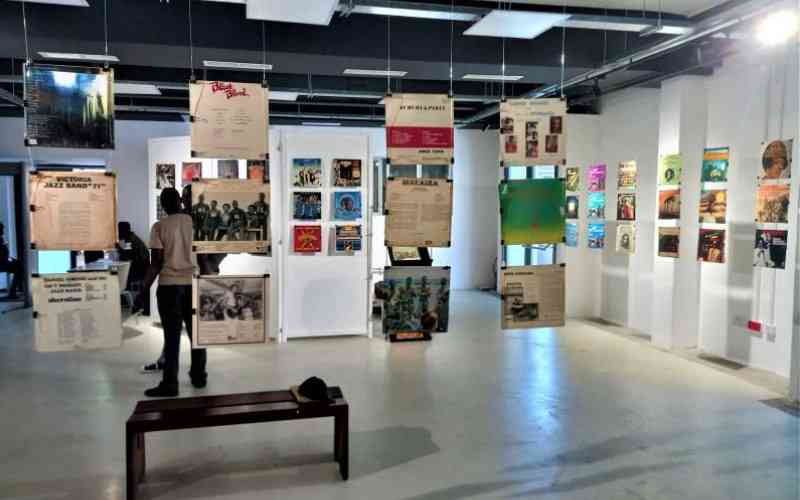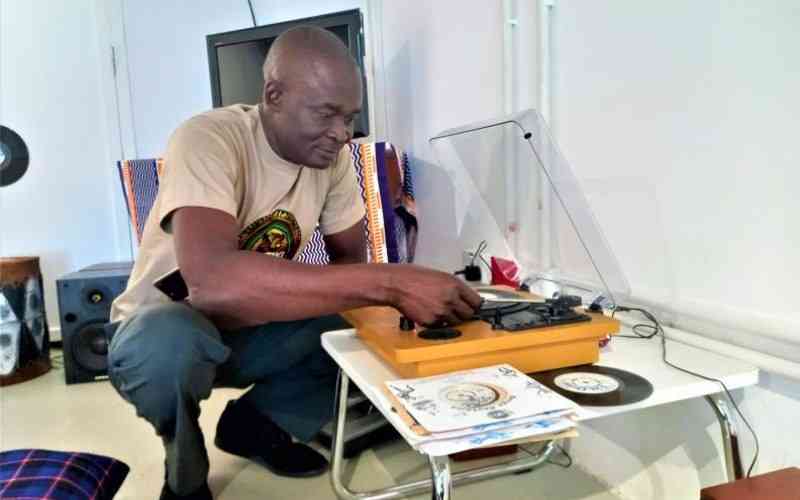
When George Ouma decided to organise a vinyl music records exhibition at the Goethe Institut, he did not anticipate the curiosity his show would generate from millennials.
"Young university students would come in and just stare at the record covers," he says.
"Some have never seen a vinyl record in their lives and are calling them big CDs. Even their parents might have had little interaction with the records and the players."
Ouma is in his early 60s and belongs to a generation that was weaned on the vinyl record player which met all entertainment needs of that era.
This is a generation that saw cassette tapes come and go. Compact Discs came and are now on their way out, while MP3 players could hardly hold their own against the phones.
That was the era when playing and listening to music was a ceremony. And the ceremony could not be hurried. First, you slowly and carefully removed the vinyl record from the sleeve, read the cover and took in the design while contemplating the lyrics.
After opening the top of the player, assuming it was not detached from the player, you placed the disc carefully and set the stylus with due care akin to a brain surgeon lest you scratched the record. There would be some crackle before the music came alive, transporting listeners to a serene world. The experience would be repeated on the other side of the disc.
With his Muziki Santuri exhibition, which opened on February 17 and closes on Thursday next week, visitors are being treated, not just to such experiences, but to the history behind the cover designs, murals of iconic Afropop musicians, antique gramophone machines, jukeboxes, vinyl record documentaries and talks on the rich history of the music of a bygone era.
Born in Ng'iya, Siaya County 62 years ago, Ouma started collecting the records in 1978 when he joined his uncle's music shop in Kisumu. The two were the main distributors of PolyGram records to western Kenya, with satellite stations in Busia and Migori.
"Before placing an order for certain music from PolyGram, I would be given one record for free to sample. I kept some and gave away others. I left the remaining records in Kisumu before moving to Nairobi in search of greener pastures," he says.

In 2000, Ouma met a friend of music producer and the founder of Ketebul Music Tabu Osusa who had visited from England. He was inquisitive about Ouma's collection of vinyl records that he regularly posted on his social media pages.
"He told me, 'George, vinyl records are coming back in Europe. People out there love Kenyan music and if you can get such records, keep them well for future use'. Then I started to think of the ones I gave to my friends and devised ways of recalling some of them," he says.
Some of his friends had since discarded the records. Others managed to scramble a few from their home 'archives'. Ouma collected the ones he could from such friends and together with the ones still in his possession, made his way to Nairobi's River Road, the home of Kenya's Benga music and collected some more.
In 2005, another group of music lovers from Germany met him, asking for advice on how to record with traditional musicians in the village. Initially, they had wanted to use Tabu Osusa as their main contact but Osusa in turn referred them to Ouma.
Ouma was then told to contact the director of Goethe Institut for contractual engagements before heading to the village and recording with the local artistes. The group came back a year later for more recording.
But Ouma was not satisfied with these recordings as he felt he was 'misusing' the locals who had little to show in return.
"I wanted the recordings to take place in Europe where the local group would stage live performances. My proposal was accepted and my people from Siaya were booked for several tours between 2013 and 2015. We would do gigs for two months in a row. At last, the local artistes were happy," he says.
Before embarking on yet another trip, the manager at one booking agency requested him to carry some of the vinyl recordings that he would play for a fee. One gig earned him close to Sh200,000, cash that he used to buy more vinyl records in the Kenyan market. Today, Ouma has a collection of close to 10,000 vinyl records.
At one time in the Netherlands, he saw a vinyl record exhibition and an idea to put up a similar show in Kenya was born.
Back home, through his Jojo Records, he approached Alliance Francaise but never got a reply. Later, he convinced Goethe Institut to host the exhibition that has seen hundreds troop in on a daily basis.
Like those of his generation, the very sight of these records and the fact that they are making a comeback in different parts of the world fills him with nostalgia.
He recalls the time when, as a youth in his village, he would play the records in what they termed as 'tea parties' for Form Four leavers. Ouma wooed his wife using the same tactics and any young man who did not have a record player had it rough in the dating scene.

"If a young man who did not own a record player wanted to attract the attention of a young lady, he had to borrow a player from a friend and only when the girl 'got into the box' would the boy return both the machine and the records. Sometimes he would return the items after the two became man and wife. The only key expense used to be the dry cell batteries. A small fundraiser would sort out the problem," says Ouma.
Today, thanks to the proliferation of digital devices, music can reach wider audiences quickly. But these methods have their drawbacks too since music can be pirated and distributed without any benefits to composers and distributors.
"You could not pirate music in the vinyl records and happily, the records have in recent times sold more copies than CDs in some parts of Europe. We hope investors can come in with a vinyl press which will be a great achievement for Kenyan musicians," he says.
 The Standard Group Plc is a multi-media organization with investments in media
platforms spanning newspaper print
operations, television, radio broadcasting, digital and online services. The
Standard Group is recognized as a
leading multi-media house in Kenya with a key influence in matters of national and
international interest.
The Standard Group Plc is a multi-media organization with investments in media
platforms spanning newspaper print
operations, television, radio broadcasting, digital and online services. The
Standard Group is recognized as a
leading multi-media house in Kenya with a key influence in matters of national and
international interest.
